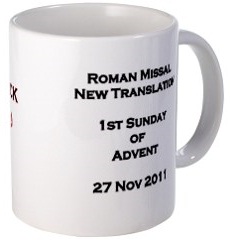 People ran around with their hair on fire a while back when Pope Francis changed the process by which translations of the liturgical texts are prepared. He gave a greater role to bishops conferences.
People ran around with their hair on fire a while back when Pope Francis changed the process by which translations of the liturgical texts are prepared. He gave a greater role to bishops conferences.
I read today at the National Catholic Register that Robert Card. Sarah, Prefect of the Congregation for Divine Worship and Discipline of the Sacraments, confirms that the Holy See retains the last word on the translations.
Of course. It can’t be any other way.
Ed Pentin, the best English-language Vaticanista now, reports:
Cardinal Robert Sarah has weighed in on Magnum Principium, Pope Francis’ motu proprio on liturgical translations, reassuring the faithful that the Vatican will continue to safeguard any changes or new liturgical translations to ensure they remain faithful to the original Latin.
In an article in the French Catholic journal L’Homme Nouveau, the prefect of the Congregation for Divine Worship and the Discipline of the Sacraments (CDW) confirmed that the motu proprio’s change to Canon 838 — which shifts some responsibility for translating liturgical texts away from the Vatican to local bishops — will still require the Vatican to give approval to any such changes or translations.
The article, officially dated Oct. 1 — the day on which Magnum Principium (The Great Principle) came into effect — bolsters the guidance issued with the motu proprio by Archbishop Arthur Roche, secretary of the CDW. Archbishop Roche stressed that the Vatican’s role in confirming texts remains an “authoritative act” presupposing “fidelity” to the original Latin.
Cardinal Sarah’s statements on the matter contradict those who see the motu proprio as a gateway to more liberal vernacular interpretations of liturgical texts, inconsistent with their Latin original.
The Holy Father, who signed Magnum Principium Sept. 3, authorized changes to Canon 838 that decentralized the translation process, giving local bishops responsibility for translating liturgical texts, while retaining the Vatican’s authority to approve or reject a proposed translation.
The CDW will no longer instruct bishops to make proposed amendments, but retains authority to confirm or veto the results at the end of the process. [I effect, however, I’ll bet that there will be unofficial instruction to make changes.]
Among other consequences, this means that the Vatican commission Vox Clara, which was established by Pope John Paul II in 2002 to help the CDW vet English translations, will no longer be needed. [I don’t see why it couldn’t still be useful as a liaison, especially now.]
[…]Liturgiam Authenticam
In his article, Cardinal Sarah begins by reasserting that the “authoritative text” concerning liturgical translations remains Liturgiam Authenticam, the 2001 instruction issued by the CDW, that aimed to ensure “insofar as possible” that texts must be translated from the original Latin “integrally and in the most exact manner.”
For this reason, he continues, the faithful translations carried out and approved by bishops’ conferences “must conform in every way to the norms of this instruction.”
[…]
Read the rest there.
































>>Of course. It can’t be any other way.
If the Holy See can say, “Hey, we’ll let you guys handle it for a while,” it can also say, “You know what, you’ve really made a mess of things, we’re going to take over again.” If the Holy See can give you your privilege and responsibility, it can take it away.
On a similar but unrelated note, it’s like “civil rights.” Your average talking head and millennial things that civil rights are absolute, but what makes them civil is that they are granted by the government and can be taken away from the government. True rights come from God (or nature if you must).
But I imagine that Pope Francis will offer deference to the bishops. So, when American bishops submit a Third Grade grammar quality translation for approval, I would think that it will be a mere formality.
I bet there will be movement behind the scenes to have Sarah moved.
Among other consequences, this means that the Vatican commission Vox Clara, which was established by Pope John Paul II in 2002 to help the CDW vet English translations, will no longer be needed.
Forgive me if I am being foolish, but unless the CDW keeps a team of English translators in house (as part of the Congregation itself), and French, and German, and Burmese, and Bulgarian, … Azerbaijanese, and … they are still going to be forced to rely on help from experts who are not part of the Congregation itself. Whether the CDW decides to pay attention to comments from Vox Clara is simply within the control of CDW, and there is no way anyone outside the CDW can change that. (For a moment I was going to say that Francis can, but then he can only do so on the basis of advice from … some OTHER English experts, so that just points to the problem all over again: the people in charge who are not English-speaking cannot do anything but rely on the advice they get from others.)
Friends, there is no other way around this issue: if the committees and bishops’ bureaucratic organs get hold of the translation process, then the agenda of those committees and bureaucrats will triumph. Whether they are in the various countries or in Rome, they can still have an agenda other than that of translating the Mass (and other liturgical rites) properly. The only solution is that WE, OURSELVES, form our own capable and willing formal organizations of translators and submit comments to Rome as qualified experts, in order to force Rome (the CDW) to at a minimum hear a voice in protest against any false agenda items, and give them a viable option.
I think I will stick to going to Masses where LATIN is used. I can get an approved translation from my hand missal. If this is the Tridentine Mass then I have NOTHING to worry about. For everyone else, I would think that this would just sow doubt into the minds of all of the faithful. A direction like this seems to be a shot over the bow at the “reform of the reform.”
When the new translations for the Novus Ordo were introduced there was wailing and knashing of teeth, especially by those in places who would normally have a saw over translation. Had this modification been in place a decade ago, there would be NO reformed translation. Maybe that is the point, to prevent future returns to authentic translation and allow interpretive translation. i.e. This is what it really means, not what it actually says. (or so they want you to think).
Regrettably, one can’t see His Eminence’ clarification as much more than a formality. In practice the proportion of Novus Ordo instances that stick to the text and the rubrics is shockingly small, to say nothing of the number of celebrations that end in applause and/or make no provision for quiet thanksgiving after Holy Communion.
The core of the problem is the intrinsic anthropocentrism of the Novus Ordo. The solution is to continue engaging in the restoration of the timeless Traditional Mass and supporting—with time, talent, treasure, and prayer—the priests who offer it.
Continued disunity predicted.
Pingback: MONDAY CATHOLICA EDITION | Big Pulpit